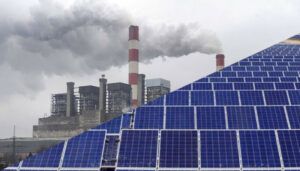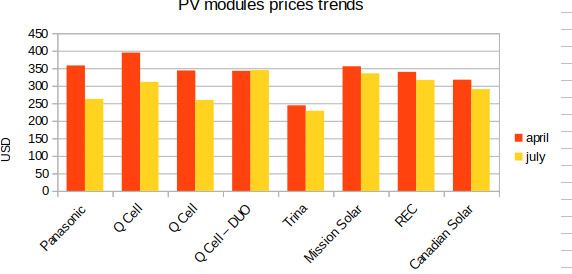intro
The solar panel angle calculator is not only a web calculator for calculating ideal setup angle for solar panel - PV modules. That was idea for which it was originally intended.
Now it is a small but powerful web application that, based on the entered data about your properties and actual electric current price in your region, calculates the amount of electricity you can get
At the same time, property can be :
1. Your house’s roof that faces south completely or partially.
2. Unused land (a meadow, an ice yard, or similar) for a mini solar power plant
Data to be entered for solar panel calclulation
In both of the preceding cases, three important information data is required:
- Geographical latitude (you don’t need to know it; you need to choose from the offered List of cities or larger cities nearby)
- The pitch angle of your roof
-
South orientation (only for the first case) If the panel is mounted
on the roof of the house facing completely or partially to the south.
It is necessary (for the northern hemisphere) that the roof of the
house faces south, south-east, or south-west. If the roof faces the
other direction (north, northwest, or northeast), the investment is
unprofitable, and this is not taken into account. It will rarely
happen that the roof is facing exactly south, but rather deviates to
the west or east. It is necessary to measure this angle of deviation
from the axis that is directed toward the south.
The roof of the house dictates the slope of the fixed panel.
Those three main parameters are required, and they dictate the conditions
for calculations. If you want to build a mini-solar power plant on unused piece of land and If you
have a plot or yard where there are no trees or similar obstacles that create shade, it is possible to use that space for a mini solar power plant. In this case, you can adjust the tilt angle of the
panel and the orientation by yourself. The only factor that you cannot influence is the latitude of the location.
-
You can choose between three options for building a mini solar power plant.
South-facing panels have a fixed tilt angle. - with an adjustable monthly tilt angle facing south (single axis tracker);
- •with an adjustable tilt angle of the panel and position that follows the sun during the day (two-axis tracker).
The simplest case is a fixed angle of the panels facing south. You can get the tilt angle as part of the SPAC web application calculation and you can also get the ideal angles of the monthly positions of the
solar panels for the case of a single axis tracker.
Program versions of Solar Panel Angle Calulator
https://solarpanelanglecalculator.com/solar-panel-calculator-user-interface/ Version 0.9 beta of the SPAC program, released in October 2022, calculated the theoretical results of angles and irradiation based on three main parameters.
Version 1.0 beta (December 2022): the program has been improved, and options have been added to calculate the expected amount of electricity based on the roof of the house or the desired mini solar power plant. The classical Liu-Joradan method system for the diffuse component and the turbidity coefficient were used for the calculation.
Version 1.1 beta , (January 2022) : the program was improved with an algorithm for the stochastic calculation of the turbidity coefficient based on statistical results, developed by site author mechanical engineer Miroslav Mitic.
Version 1.2 beta (March 2022) brings us a new and redesigned user interface and the possibility of choosing an inverter in accordance with the selected solar panels (PV modules). Calculation of: inverter input voltage, wiring recommendation, annual electricity production, and annual profit from electricity production—in this case, the price of electricity for a specific region must be entered.
Version 1.25 beta (May 2023) is available for testing. Compared to the previous version 1.2, version 1.25 offers the following improvements: Fixed some minor errors in calculations The number of tables and data for display has increased. Due to the large number of data tables, the possibility of not displaying them (Hide/Show) has been introduced. Choosing the inverter after calculating the current gain from the selected solar panels and then continuing the calculation
Note: If the PV module and inverter are selected that have a price and you enter the electricity price for your area, you get a complete estimate of the investment, estimated annual electricity production, and profit from the investment. There are still two methods for calculation: the classic Liu Jordan method and my correction of that method, which is the default. My method corrects the classic ones by introducing into the calculation the statistical analysis of the location’s insolation (cloudiness, Linke turbidity coefficient, etc.).
Version 1.27 (June 2023) :
U.I. changed to white.
Graphic representation of the plot plan of the mini solar power plant with the dimensions of the space occupied by the panels
All versions are beta releases because they are still in the testing
phase. The algorithm is stable, but there are possibilities of small
errors when entering statistics.
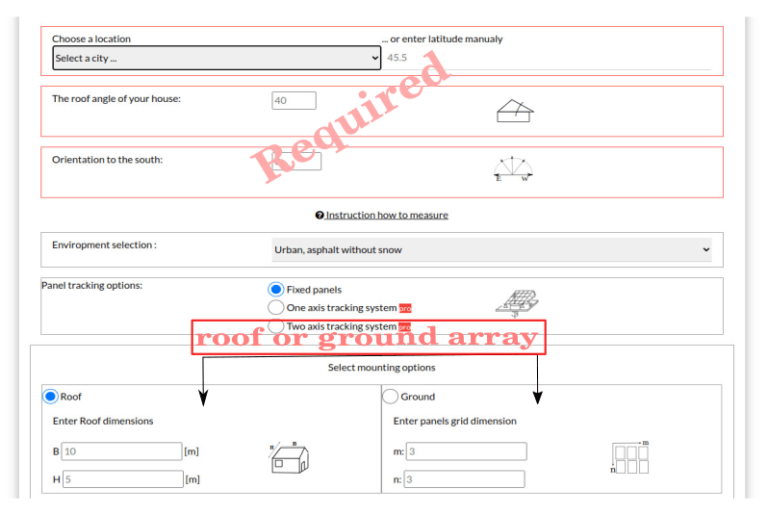
Solar Panel Angle 1.2x calculator - user interface
The user interface consists of six parts:
REQUIRED
- Choosing the nearest location or manually entering latitude; in the other case, the result is only theoretical values. This entry is required. 2
- Panel options: in the non-commercial version, only fixed panels are counted. Do not change anything there.
3. The roof of the house or panel and orientation a deviation from the south side. If the deviation is in the south-southeast direction, values from -1 to -90 are entered; if the deviation is in the southwest direction, values from 1 to 90 are entered. It is measured from the axis pointing south!
These 3 values are required. how to measure read here …
Next parameters are default, but you can change them as you will :
* Enviropment option ( according of climate condition and position)
* Panel tracking options : fixed, one axis trackiong and two axis tracking
Next stage is selecting beetween two option:
1. mounting the panels on a fixed roof It is understood that the roof faces south completely or partially and that there are no obstacles on it (skylights, antennas, chimneys, or similar sources of shadow). Then enter the length and width of the roof.
2 The option of mounting a grid of salad panels You can design your own M X N panel grid and install as many as you want on the flat roof or surface. In the second case, it is preferable when you already have the possibility to orient the panels towards the south.
Next PV module selection and placement options This is the program’s most interesting and useful option. It was introduced in version beta 1.0. First, a splash panel is selected from the drop-down list. In the database, there are some solar panels of different powers or dimensions. You can decide how you want to judge whether it will fit dimensionally or in the intended investment. And in this case, there are two options. Check the following box:
5. Calculation and setting option You can choose the type of calculation in this section. My system consists of the stochastic modified Liu-Joradn method (the default), and you can also choose a classic calculation system. After entering all the data, the results are obtained by selecting the “Calculate ”button.
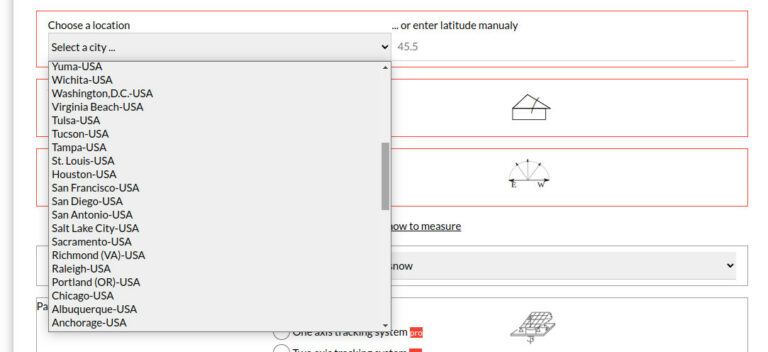

Next choice: environment or leave default “Urban asphalt with snow in December and January ”
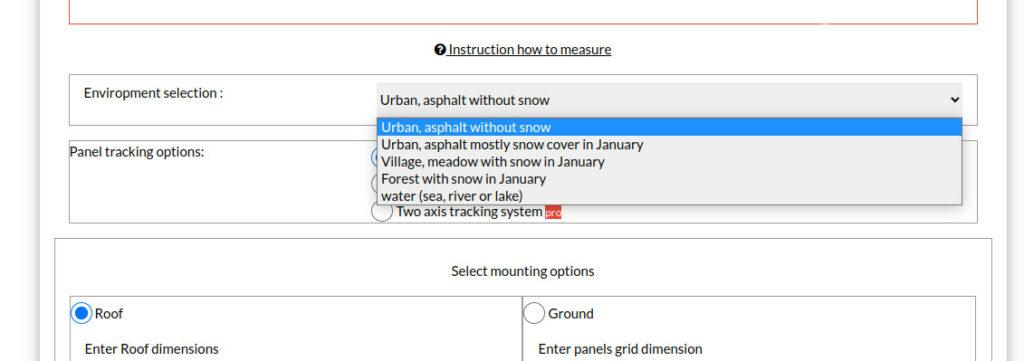
Mount setting : We have 3 options: Fixed ( Default), One axis tracking and Two axis tracking
The next important step is selecting between two possibilities: mounting panels on the roof or building panel arrays on the ground (power plants).
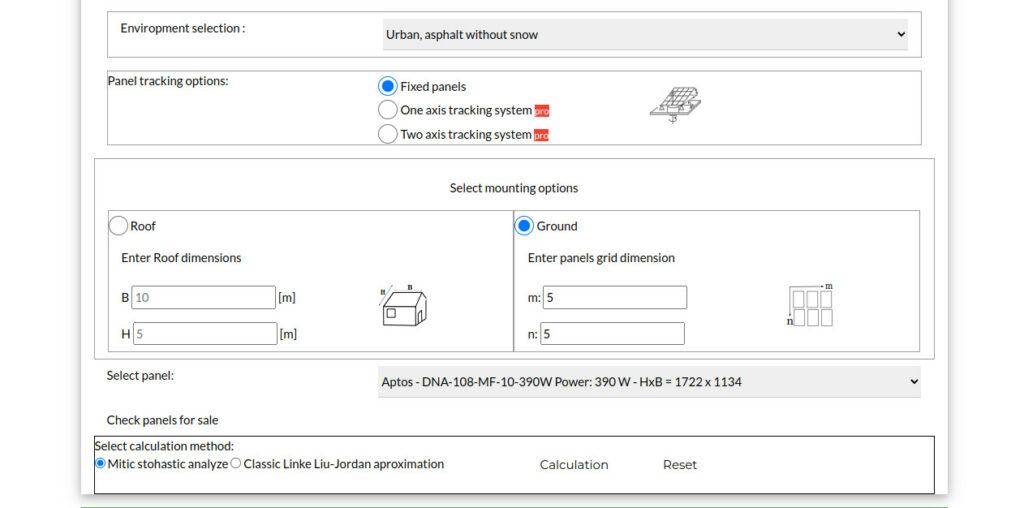
The next step is to select a solar panel or PV module. We have to take into account nearby appropriate dimensions of the roof for beeter array use.
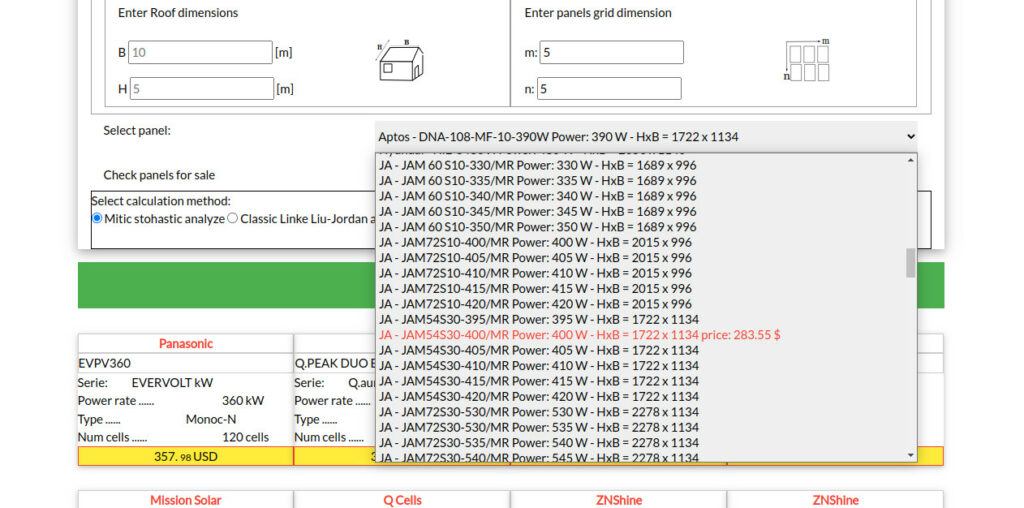
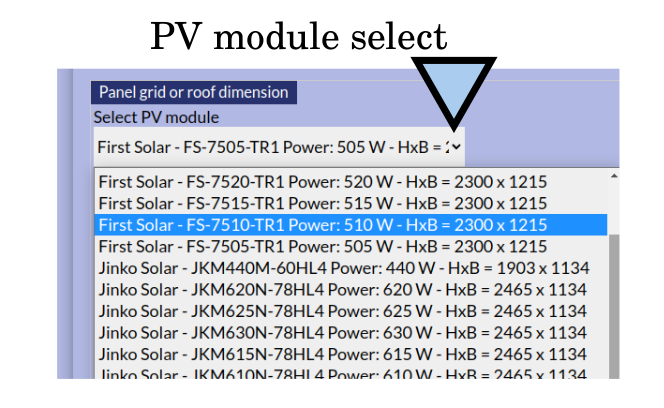
Results
The result consists of two parts: theoretical and real, i.e., the estimation of the gain of electrical energy. More details in the RESULTS page
Conclusion
The user interface is very simple and even fun. The program is quite powerful, and you can try various PV module placement options and get quite precise results.


